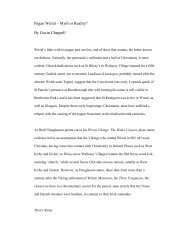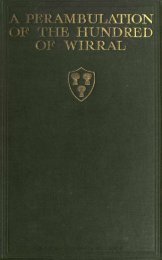- Page 1 and 2:
RAMBLES ROUND THE OLD CHURCHES OF
- Page 3:
VUA/ttvj J1a-X \-A-Ajj.A/./;i>LLAO
- Page 10 and 11:
P/iy II . II. Ti'inkim^on OLD GOTHI
- Page 13:
D/4 C6pB65 ^0 Mv iFattier.
- Page 16 and 17:
Introduction. at Nesto7i, Bromborou
- Page 18 and 19:
Introduction. I believe that Dr. Bu
- Page 20 and 21:
Preface. sent volume is placed a Bi
- Page 22 and 23:
Preface. I wish to thank the follow
- Page 24 and 25:
Contents. CHAPTER IV. The Old Churc
- Page 26 and 27:
Contents. CHAPTER XII. Old Wood-car
- Page 28:
List of Illustrations. FACING PLATE
- Page 32 and 33:
ONE THE OLD CHURCHES OF WIRRAL of t
- Page 34 and 35:
THE OLD CHURCHES OF WIRRAL blocks.
- Page 36 and 37:
THE OLD CHURCHES OF WIRRAL cases th
- Page 38 and 39:
THE OLD CHURCHES OF WIRRAL the Stan
- Page 40 and 41:
THE OLD CHURCHES OF WIRRAL entirely
- Page 43 and 44:
GROWTH OF WIRRAL OLD CHURCHES somet
- Page 45 and 46:
GROWTH OF WIRRAL OLD CHURCHES John
- Page 47 and 48:
GROWTH OF WIRRAL OLD CHURCHES Stanl
- Page 49 and 50:
GROWTH OF WIRRAL OLD CHURCHES comme
- Page 51 and 52:
GROWTH OF WIRRAL OLD CHURCHES Our L
- Page 53 and 54:
GROWTH OF WIRRAL OLD CHURCHES mon t
- Page 55 and 56:
GROWTH OF WIRRAL OLD CHURCHES paris
- Page 57 and 58:
CHAPTER II. THE ARCHITECTURE OF WIR
- Page 59 and 60:
ARCHITECTURE OF WIRRAL OLD CHURCHES
- Page 62 and 63:
Pliotounii'li /" " • H. Toiiil^ii
- Page 64 and 65:
THE OLD CHURCHES OF WIRRAL church,
- Page 67 and 68:
ARCHITECTURE OF WIRRAL OLD CHURCHES
- Page 69 and 70:
ARCHITECTURE OF WIRRAL OLD CHURCHES
- Page 71 and 72:
ARCHITECTURE OF WIRRAL OLD CHURCHES
- Page 73 and 74:
ARCHITECTURE OF WIRRAL OLD CHURCHES
- Page 75:
I'l:rim:xi)I(1 i.Au doorww WEST KJR
- Page 78 and 79:
CHAPTER III. THE BELLS OF WIRRAL. B
- Page 80:
THE OLD CHURCHES OF WIRRAL placed o
- Page 83 and 84:
THE BELLS OF WIRRAL a peal of eight
- Page 85 and 86:
4. 5. 6. THE BELLS OF WIRRAL " WBi\
- Page 87 and 88:
THE BELLS OF WIRRAL The custom of e
- Page 89 and 90:
THE BELLS OF WIRRAL some repairs in
- Page 91 and 92:
THE BELLS OF WIHRAL be in tune with
- Page 93 and 94:
THE BELLS OF WIRRAL eight bells 40,
- Page 95 and 96:
THE BELLS OF WIRRAL utterly forborn
- Page 97 and 98:
THE BELLS OF WIIIRAL In connection
- Page 99 and 100:
THE BELLS OF WIRRAL peal rung for h
- Page 101 and 102:
CHAPTER IV. THE OLD CHURCHYARDS OF
- Page 103 and 104:
THE OLD CHURCHYARDS OF WIRRAL was g
- Page 105 and 106:
THE OLD CHURCHYARDS OF WIRRAL direc
- Page 107 and 108:
THE OLD CHURCHYARDS OF WIRRAL the c
- Page 109 and 110:
THE OLD CHURCHYARDS OF WIRRAL them
- Page 111 and 112:
THE OLD CHURCHYARDS OF WIRRAL are o
- Page 114 and 115:
PLATE VII. From tin oiiiliiiitl Pei
- Page 116 and 117:
THE OLD CHURCHES OF WIRRAL tombston
- Page 118: THE OLD CHURCHES OF WIRRAL the firs
- Page 121 and 122: THE OLD CHURCHYARDS OF WIRRAL ness.
- Page 124 and 125: HOLY WATER STOUF WOODCHURCH P/ioloi
- Page 126 and 127: THE OLD CHURCHES OF WIRRAL living ;
- Page 128 and 129: CHAPTER V. WIRRAL CHURCH DEDICATION
- Page 130 and 131: THE OLD CHURCHES OF WIRRAL cast hol
- Page 132 and 133: THE OLD CHURCHES OF WIRRAL once a p
- Page 134 and 135: THE OLD CHURCHES OF WIRRAL she neve
- Page 136 and 137: THE OLD CHURCHES OF WIRRAL '* A Per
- Page 138 and 139: THE OLD CHURCHES OF WIRRAL ation ap
- Page 140 and 141: THE OLD CHURCHES OF WIRRAL greater
- Page 143 and 144: WIRRAL CHURCH DEDICATIONS affirms t
- Page 145 and 146: WIRRAL CHURCH DEDICATIONS liberated
- Page 147 and 148: WIRRAL CHURCH DEDICATIONS were brok
- Page 149 and 150: CHAPTER VI. THE OLD FONTS OF WIRRAL
- Page 151 and 152: THE OLD FONTS OF WIRRAL This very c
- Page 153 and 154: THE OLD FONTS OF WIRRAL ears, nostr
- Page 155 and 156: THE OLD FONTS OF WIRRAL obligation
- Page 157 and 158: THE OLD FONTS OF WIRRAL church, was
- Page 159: Phnt.iiJ'iit'lt 1'^ >!'// Titinkiii
- Page 162 and 163: THE OLD CHURCHES OF WIRRAL Wirral,
- Page 164 and 165: THE OLD CHURCHES OF WIRRAL customs
- Page 166 and 167: CHAPTER VII. OLD PEWS AND PULPITS I
- Page 170 and 171: THE OLD CHURCHES OF WIRRAL and lean
- Page 172: THE OLD CHURCHES OF WIRRAL preceden
- Page 175 and 176: OLD PEWS AND PULPITS parchment prin
- Page 177 and 178: OLD PEWS AND PULPITS diction. One S
- Page 179 and 180: OLD PEWS AND PULPITS were clusterin
- Page 181 and 182: OLD PEWS AND PULPITS Shotwick the o
- Page 183 and 184: OLD PEWS AND PULPITS was about to b
- Page 185 and 186: OLD PEWS AND PULPITS our, * the cus
- Page 187: I'LATE XIII. I'lioloiJrtil'li hy Al
- Page 190 and 191: THE OLD CHURCHES OF WIRRAL BIBLIOGR
- Page 192 and 193: THE OLD CHURCHES OF WIRRAL sewiden
- Page 194 and 195: THE OLD CHURCHES OF WIRRAL was foun
- Page 196 and 197: THE OLD CHURCHES OF WIRRAL BTune ^f
- Page 198 and 199: THE OLD CHURCHES OF WIRRAL an early
- Page 200 and 201: THE OLD CHURCHES OF WIRRAL Foxe's B
- Page 203 and 204: OLD BIBLES AND BOOKS belonged to Bi
- Page 205 and 206: OLD BIBLES AND BOOKS BIBLIOGRAPHY.
- Page 207 and 208: THE ALTAR IN WIRRAL OLD CHURCHES an
- Page 209 and 210: THE ALTAR IN WIRRAL OLD CHURCHES in
- Page 211 and 212: THE ALTAR IN WIRRAL OLD CHURCHES Bu
- Page 213 and 214: THE ALTAR IN WIRRAL OLD CHURCHES of
- Page 215 and 216: THE ALTAR IN WIRRAL OLD CHURCHES br
- Page 217 and 218: THE ALTAR IN WIRRAL OLD CHURCHES J.
- Page 219 and 220:
OLD PLATE IN WIRRAL CHURCHES THE mo
- Page 221 and 222:
OLD PLATE IN WIRRAL CHURCHES The fo
- Page 223 and 224:
OLD PLATE IN WIRRAL CHURCHES And as
- Page 225:
I'liotoiixil'h by tlif AutliLT ELIZ
- Page 228 and 229:
THE OLD CHURCHES OF WIRRAL SO ordin
- Page 231 and 232:
OLD PLATE IN WIRRAL CHURCHES About
- Page 233:
f'liolot/riil'/i h\ W. II. Toinkiii
- Page 236 and 237:
THE OLD CHURCHES OF WIRRAL died Oct
- Page 238 and 239:
THE OLD CHURCHES OF WIRRAL eel. Thr
- Page 240 and 241:
THE OLD CHURCHES OF WIRRAL means of
- Page 242 and 243:
THE OLD CHURCHES OF WIRRAL my Lord.
- Page 244 and 245:
THE OLD CHURCHES OF WIRRAL drinking
- Page 246:
THE OLD CHURCHES OF WIRRAL Martene
- Page 249 and 250:
CHANCEL RELICS IN WIRRAL OLD CHURCH
- Page 251 and 252:
CHAPTER XII. OLD WOOD-CARVINGS IN W
- Page 253 and 254:
OLD WOOD-CARVINGS IN WIRRAL CHURCHE
- Page 256 and 257:
2. PLATE XIX. Photoorahli by ft'. /
- Page 258:
THE OLD CHURCHES OF WIRRAL of this
- Page 261 and 262:
OLD WOOD-CARVINGS IN WIRRAL CHURCHE
- Page 263 and 264:
OLD WOOD-CARVINGS IN WIRRAL CHURCHE
- Page 265 and 266:
OLD WOOD-CARVINGS IN WIRRAL CHURCHE
- Page 267 and 268:
OLD WOOD-CARVINGS IN WIRRAL CHURCHE
- Page 270 and 271:
ALMS DISH RACKFORD CHURCH PLATE XXT
- Page 272 and 273:
THE OLD CHURCHES OF WIRRAL fusion t
- Page 275 and 276:
OLD WOOD-CARVINGS IN WIRRAL CHURCHE
- Page 277 and 278:
HATCHMENTS AND HERALDIC PANELS is a
- Page 279 and 280:
HATCHMENTS AND HERALDIC PANELS Hous
- Page 281 and 282:
HATCHMENTS AND HERALDIC PANELS requ
- Page 283 and 284:
HATCHxMENTS AND HERALDIC PANELS the
- Page 285 and 286:
HATCHMENTS AND HERALDIC PANELS 7.
- Page 287 and 288:
HATCHMENTS AND HERALDIC PANELS thos
- Page 289 and 290:
HATCHMENTS AND HERALDIC PANELS high
- Page 291 and 292:
HATCHMENTS AND HERALDIC PANELS comm
- Page 293:
iii:k \i 1 )i( r\Ni:i. l'/iottUJ"i/
- Page 296 and 297:
THE OLD CHURCHES OF WIRRAL seen in
- Page 298 and 299:
THE OLD CHURCHES OF WIRRAL The comm
- Page 300 and 301:
THE OLD CHURCHES OF WIRRAL united b
- Page 302 and 303:
CHAPTER XIV. STAINED GLASS IN THE O
- Page 304 and 305:
THE OLD CHURCHES OF WIRRAL or it wo
- Page 306 and 307:
THE OLD CHURCHES OF WIRRAL the vari
- Page 308 and 309:
THE OLD CHURCHES OF WIRRAL was most
- Page 310 and 311:
THE OLD CHURCHES OF WIRRAL To the l
- Page 312 and 313:
the old churches of wirral St. Pete
- Page 314 and 315:
THE OLD CHURCHES OF WIRRAL three wi
- Page 317 and 318:
STAINED GLASS IN WIRRAL OLD CHURCHE
- Page 319 and 320:
stained glass in wirral old churche
- Page 321 and 322:
STAINED GLASS IN WIRRAL OLD CHURCHE
- Page 323 and 324:
INDEX ALMS BOXES PAGE 200 Altar At
- Page 325 and 326:
INDEX. Chancel 8, PAGE. 159 Churchy
- Page 327 and 328:
INDEX. PAGE. Chained Bibles 143, 14
- Page 329 and 330:
INDEX. PAGE. Easter Sepulchre UASTH
- Page 331 and 332:
INDEX. PAGE. MANTLING 215, 216 Mars
- Page 333 and 334:
INDEX. PAGE. Saint Andrew St. Barth
- Page 335 and 336:
INDEX. THORNTON HOUGH Three-decker
- Page 342 and 343:
Form L9-Series 4939 UNIVERSITY OF C




